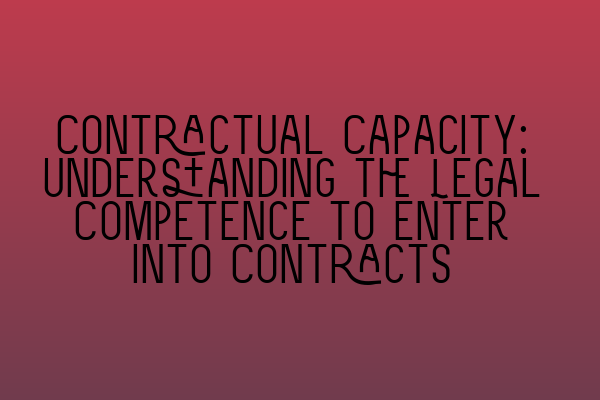Welcome to SQE Contract Law, where we provide expert legal advice and guidance on all aspects of contract law. In this blog post, we will be delving into the topic of contractual capacity and understanding the legal competence to enter into contracts. Understanding contractual capacity is crucial for both solicitors and individuals entering into contractual agreements, as it ensures that contracts are legally binding and enforceable. So, let’s dive into the world of contractual capacity.
What is Contractual Capacity?
Contractual capacity refers to the legal competence of a person to enter into a contract. It determines whether an individual has the mental and legal ability to understand the terms of the contract and be bound by its provisions. In simpler terms, contractual capacity is the legal concept that safeguards individuals from being taken advantage of in contractual agreements due to their age, mental capacity, or other factors.
The Importance of Contractual Capacity
Contractual capacity is crucial because it ensures fairness and protects individuals from entering into agreements that they do not fully understand or are unable to fulfill. Without contractual capacity, contracts could be easily exploited, leading to unfair and unenforceable agreements.
As a solicitor, it is essential to assess your client’s contractual capacity before advising them on entering into contracts. By doing so, you can ensure that your client fully understands the legal implications and consequences of their actions. This not only protects your client’s interests but also strengthens the overall integrity of the legal profession.
Factors Affecting Contractual Capacity
Several factors can affect an individual’s contractual capacity:
- Age: In most jurisdictions, individuals must reach a certain age, typically 18 years old, to have full contractual capacity. Minors, those under the age of majority, generally have limited capacity and may require parental or guardian consent for contracts to be legally binding.
- Mental Capacity: Individuals with mental impairments or disabilities may have limited contractual capacity depending on the severity of their condition. In such cases, it may be necessary to involve a legal guardian or seek legal intervention to determine the individual’s capacity.
- Intoxication: Contracts entered into while under the influence of drugs or alcohol may be deemed voidable. The intoxicated party may have the option to either void the contract or ratify it once they regain their sobriety.
- Fraud or Duress: Contracts that are entered into under duress or as a result of fraud may also be voidable. In such cases, the aggrieved party has the right to seek legal remedies.
It is important to note that contractual capacity can vary depending on the jurisdiction and specific circumstances. As a solicitor, you must familiarize yourself with the laws and regulations of your jurisdiction to effectively advise your clients.
The Role of Solicitors in Assessing Contractual Capacity
Solicitors play a vital role in assessing their clients’ contractual capacity. By conducting a thorough assessment, solicitors can ensure that their clients have the necessary capacity to enter into legally binding contracts.
As part of the assessment process, solicitors should:
- Evaluate their client’s age, mental capacity, and any potential impairments or disabilities.
- Ensure that their client fully understands the terms, obligations, and consequences of the contract.
- Verify that the contract is fair, reasonable, and in their client’s best interests.
- Provide guidance and advice on any legal implications or risks associated with the contract.
By thoroughly assessing contractual capacity, solicitors protect their clients from entering into agreements that may be detrimental to their interests. Additionally, solicitors help maintain the integrity of the legal profession by upholding ethical standards and ensuring that contracts are fair and enforceable.
Conclusion
Contractual capacity is a fundamental aspect of contract law that ensures fairness and protects individuals from exploitative agreements. As a solicitor, understanding and assessing your client’s contractual capacity is essential for providing accurate legal advice and ensuring the integrity of the legal profession.
If you have any questions about contractual capacity or require legal assistance with contract law matters, please do not hesitate to contact us at SQE Contract Law. Our team of expert solicitors is here to help you navigate the complexities of contract law.
Related Articles:
- Barrister vs. Solicitor: A Comprehensive Comparison
- Embracing the Rise of Virtual Law Practices
- Unveiling Real-Life Case Studies: Insights into Legal Practice and Decision-Making
- Exploring Solicitor Salaries in the UK: Average Earnings and Factors Affecting Income
- Mastering Client Relationship Management: Skills for Solicitors to Enhance Trust and Loyalty
